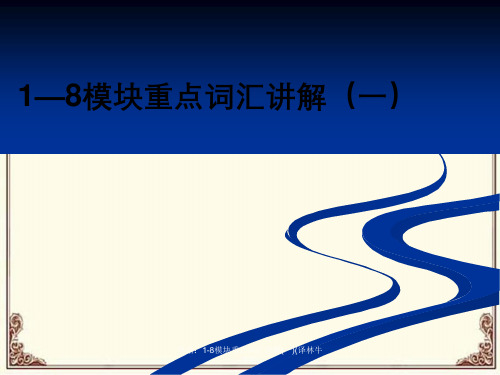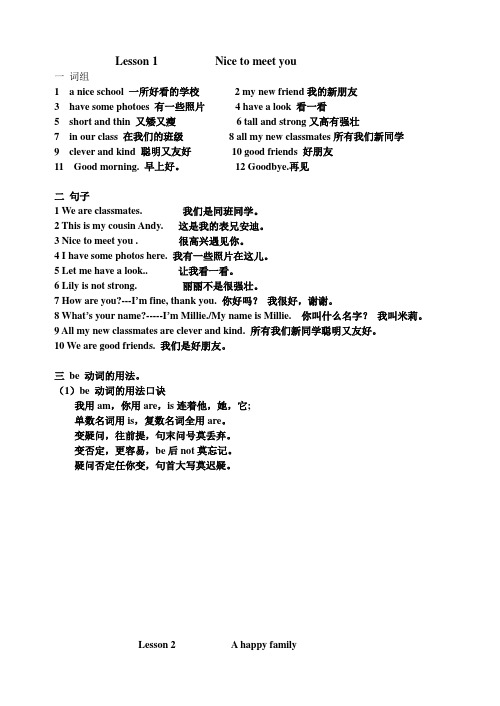牛津译林版2018预备课程关键句总结Lesson1-8
- 格式:docx
- 大小:17.75 KB
- 文档页数:4

新牛津译林版八年级上8A Unit1-8语法总结形容词和副词都有三个等级,即原级、比较级和最高级。
比较级用于两者之间的比较,表示“更……”,而最高级用于三者或三者以上之间的比较,表示“最……”。
比较级前面通常会加much、even或a little修饰,其中even和much只能修饰比较级。
常见的修饰语包括still、even、any、quite(a bit)、almost、nearly、just、rather、a little、a bit、much、a lot、far、many、twice、ten times、one fourth、two pounds和three years。
形容词的比较级和最高级的构成有规则变化和不规则变化。
规则变化包括直接加、去e加、双写加、变y加以及more/most。
不规则变化则是指一些常见的形容词,如good/well、bad/ill、many/much、little、far、old以及XXX等。
形容词的比较等级还有一些常见的句型,如“A=BA+ V + as + adj./adv。
+ as + B”(与……一样)、“A≠ BA + V + not +as/so + adj./adv。
+ as + B”(与……不一样)以及“A。
B或A <B,A + V +比较级+ than + B”(比……更……)。
这些句型可以帮助我们更好地理解和运用形容词的比较等级。
XXX.XXX。
we can use the structure A + V + twice/four times/。
+ as + adj./adv。
+ as + B。
For example。
"This room is twice as large as that one" means that the entire room is twice the size of the other room。


Lesson 1 Nice to meet you一词组1 a nice school 一所好看的学校2 my new friend我的新朋友3 have some photoes 有一些照片4 have a look 看一看5 short and thin 又矮又瘦6 tall and strong又高有强壮7 in our class 在我们的班级8 all my new classmates所有我们新同学9 clever and kind 聪明又友好10 good friends 好朋友11 Good morning. 早上好。
12 Goodbye.再见二句子1 We are classmates. 我们是同班同学。
2 This is my cousin Andy. 这是我的表兄安迪。
3 Nice to meet you . 很高兴遇见你。
4 I have some photos here. 我有一些照片在这儿。
5 Let me have a look.. 让我看一看。
6 Lily is not strong. 丽丽不是很强壮。
7 How are you?---I’m fine, thank you. 你好吗?我很好,谢谢。
8 What’s your name?-----I’m Millie./My name is Millie. 你叫什么名字?我叫米莉。
9 All my new classmates are clever and kind. 所有我们新同学聪明又友好。
10 We are good friends. 我们是好朋友。
三be 动词的用法。
(1)be 动词的用法口诀我用am,你用are,is连着他,她,它;单数名词用is,复数名词全用are。
变疑问,往前提,句末问号莫丢弃。
变否定,更容易,be后not莫忘记。
疑问否定任你变,句首大写莫迟疑。
一词组1 a photo of my family一张我的全家福2 the woman with long hair长着长头发的妇女3 how old 多大(年龄)4 twelve years old十二岁5 in a big hospital 在一个大医院上班6 speak English 说英语7 thirty-eight 三十八8 look young看起来年轻9 a happy family一个幸福的家庭10 have cousins有堂兄妹11 love them爱他们12 forty-two 四十二13 a farmer 一个农民14 a taxi driver一个出租车司机二句子1 This is a photo of my family .这是一张我的全家福。


牛津译林版Starter-Unit-1-8各单元知识点2016级英语Starter期末复习资料Lesson 1 Nice to meet you!1.Important phrase(重要短语):have a look 看一看;have a look at sth 看一看…:have a look at the dog. 看一看这只狗。
tall and strong 又高又壮;short and thin 又矮又瘦;clever and kind 聪明又善良;He is tall and strong. 他又高又瘦。
We are clever and kind.我们聪明又善良。
Mr 先生(所有男性);Mrs 夫人/太太(已婚);Miss 小姐(未婚);Ms 女士(不知道已婚还是未婚)表达方式:称谓+姓(首字母都要大写):Mr Wang 王先生;Mrs Li 李夫人;Aunt Gao高阿姨;Uncle Chen 陈叔叔指示代词:this 这个;that 那个;these 这些;those 那些。
I’m = I am 我是;You’re = You are 你是;We’re = We are 我们是;He’s = He is 他是;She’s = She is 她是;They’re = They are 他们是;It’s = It is 它是; I’m not = I am not我不是;isn’t = is not 不是;aren’t = are not.2.Important sentence patterns (重要句型):Hi / Hello / How do you do.Good morning/ afternoon / evening / nightGood bye. / Bye.This is …英语中,介绍某人时,常用This is …或That is … , (注意:this is 不能缩写成为this’s)而不直接说He is…或She is…, 例如:This is Simon and that is Linda. 这是Simon, 那是Linda。

牛津译林版八年级上册英语Unit 1-Unit 8 语法知识点总结汇编U1 形容词的比较级和最高级构成:①单音节形容词和少数双音节形容词,在词尾加-er , -est②部分双音节词和多音节词,在其前面加more(比较级)/most(最高级)important-more important-most important③不规则变化形容词比较级的用法:形容词最高级的用法★最高级和比较级同义句转换:Li Lei is the tallest student in his class.=Li Lei is taller than any other student/the other students/the others in his class.►形容词最高级前若有不定冠词a 表示“非常”Spring is a best season.春天是一个非常好的季节。
U2 ◎数量的比较一、两者数量的比较1.用“more... than. . .”结构表示“...比...多”,more+可名复/不可名。
You have more books than I.你的书比我的多I have more free time than you.我的空余时间比你的多。
2.用“fewer/less... than..."结构表示“......比....少”,fewer+可名复,less+不可名。
Our school has fewer weeks off for the summer holiday than yours.我们学校比你们学校的暑假少放几个星期。
He spends less money on clothes than I.他在衣服上花的钱比我少。
二、三者或三者以上的数量上的比较1.用“the most”表示“最多”,most+可名复/不可名We study the most subjects of all.在所有人当中我们学习的科目最多。
牛津译林英语八年级下册全册知识点汇总8B Unit11.I've just eaten it.我刷才把它吃了。
just作副词“刚刚,刚才”,通常与现在完成时连用。
Mr Wang has just left our classroom. 王老师刚刚离开我们的教室。
I've just heard the news. 我刚听到这个消息。
①just副词“正好,恰好”,常与名词、名词性短语或句子连用,起加强语气的作用。
This jacket is just my size. 这件夫克衫正合我的尺码。
②just now“刚才,刚刚”=a moment ago,常用于句末。
I met one of my friends in the street just now.我刚才在衡上遇到了我的一个朋友。
③just then“就在那时”。
Just then,someone knocked at the front door. 就在那时,有人在前门敲门。
2.You've changed,Eddie.埃迪,你变了。
①change不及物动词“变化”,过去分词changedThe city has changed a lot since 2000. 这个城市自从2000年以来变化很大。
In England,the weather changes very often. 在英格兰,天气时常变化。
②change及物动词“交换;改变;换乘”。
Can I change seats with you? 我可以和你换一下座位吗?At last,he changed his mind. 最后,他改变了主意。
I stopped in Moscow only to change planes. 我为了转机才在莫斯科停留的。
③change可数名词“改变,变化,转变”;不可数名词“零钱”。
Great changes have taken place in this city since 1984.自从1984年以来,这个城市已发生了很大的变化。
新牛津译林版八年级上8A Unit1-8语法总结形容词和副词有三个级别:原级、比较级和最高级。
比较级用于两者之间的比较,表示“前者比后者更……”,一般用much、even、a little修饰,其中even和much只能修饰比较级。
最高级用于三者及三者以上之间的比较,表示“某人或某物在某个范围内最……”。
形容词的比较级(-er)和最高级(-est)的构成有规则和不规则两种。
规则的构成方式有口诀可记:直接加、去e加、双写加、变y加;不规则的则需要记忆。
比较级前可以加修饰语,如still、even、any、quite(a bit)、almost、nearly、just、rather、a little、a bit、much、a lot、far、many、twice、ten times、one fourth、two pounds、three years 等。
形容词和副词的比较级常见的句型有三种:与……一样(A=BA+ V + as + adj./adv。
+ as + B)、与……不一样(A≠BA + V + not + as/so + adj./adv。
+ as + B)、比……更……(A。
B或A < BA + V +比较级+ than + B)。
例如:他和我一样高(He is as tall as I/me.);他和他的父亲一样是个好教师(Heis as good a teacher as his father.);他们干得事没有你多(They didn’t do as/so much work as you did.);我从来没有见过像这样旧的车(I’ve never seen as/so old a car as this.)。
Tom is older than his brother by two years.XXX.This room is twice the size of that one.XXX is 49 times bigger than the moon.XXX.XXX.The more we get together。
译林版三年级英语下册Unit1-8全册知识点汇总译林版三年级英语下册Unit1知识点汇总词汇分类事物:door 门window 窗,窗户blackboard 黑板book 书rubber 橡皮parrot 鹦鹉动作:open 开;打开close 关上;合上其他:Mr 先生please 请the 这个;这些;那个;那些don't=do not sorry 对不起短语①Open the door②close the window 关上窗户③listen to 听④come in 进来⑤in class 在上课惯用表达式①Stand up.起立②Sit down,please.请坐。
③Good morning.早上好④What's this? 这是什么?⑤I'm sorry. 对不起知识点精析1. 祈使句课文应用:Stand up.起立。
Sit down,please.请坐。
Come in,Mike. 进来,迈克。
(1)表示请求、命令或劝告等的句子叫祈使句。
它通常省略主语(you),根据语气的强弱,句末使用感叹号(!)或句号(.),朗读时常用降调。
例如:Go and wash your hands.去洗你的手。
(表示命令)Be quiet,please.= Please be quiet.请安静。
(表示请求)Be kind to our sisters.对我们的姐妹要友善。
(表示劝告)Keep off the grass. 匆践踏草坪。
(表示禁止)(2)为了使语气委婉,使用祈使句时可加上please。
please可位于祈使句的句首(其后通常不用逗号)或句末(其前通常用逗号)。
【注意】有的祈使句在意思表示明确的情况下,还可以省略动词。
例如:This way, please. = Go this way,please. 请这边走。
2. 祈使句类型:(1)Be 型祈使句: Be+表语(+其他),例如: Be careful. 小心。
1.---This is my cousin Andy. We go to the same school. --- Nice to meet you. ---Nice to meet you, too.---这是我的表哥安迪。
我们去同一所学校念书。
---见到你很高兴。
---见到你我也很高兴。
2.---What’s your name?--- I’m Millie. ---How are you today? ---I’m fine, thank you.---你叫什么名字?---我是米莉。
---你今天好吗?---我很好,谢谢。
3.Lucy is tall and thin. All my new classmates are clever and kind. I’m happy to make friends with them.露西又高又瘦。
我所有的新同学既聪明又友善。
我们很高兴和他们交朋友。
4.---This is a photo of my family. ---Let me have a look.---这是我的全家福。
---让我看一看。
5.---Who’s the woman with long hair? ---She’s my mum. She can speak English.---那个留着长发的女人是谁?---她是我的妈妈。
她会说英语。
6.My father is a doctor in a big hospital.我爸爸在一家大医院上班。
7.I have no brothers or sisters, but I have cousins. We are a happy family.我没有兄弟姐妹,但是我有堂兄弟。
我们是幸福的一家人。
8.It’s time for class. Open you books and turn to page 16. Read the words after me.现在是上课的时候了。
打开你们的书本并翻到16页。
跟着我读单词。
9.Listen to the tape again. Write down your answers in your exercise books.再听一遍磁带。
在练习本上写下你们的答案。
10.Welcome to our school. There are fifteen desks and thirty chairs for us in the classroom.欢迎来到我们的学校。
教室里有15张桌子和30张椅子给我们。
11.There’s also a big desk for our teachers. There’s a map of China in the classroom.也有一张大的桌子给我们的老师。
教室里有一张中国地图。
12.There aren’t any TVs, but there is a computer.没有电视机但是有一台电脑。
13.---How many playgrounds are there in your school? ---There’s only one.---你们学校有多少个操场? ---只有一个。
14.---Is there a library in your school? ---No, there isn’t, but there are two reading rooms.---你们学校有图书馆吗?---没有,但是有两件阅览室。
15.---What’s in the box? ---There is a shirt. ---What colour is it?--- It’s blue.---盒子里有什么?---有一条衬衫。
---它是什么颜色的?---它是蓝色的。
16.---Whose skirts are they? ---They are their yellow skirts.---它们是谁的衬衫?---它们是他们的黄色衬衫。
17.---Can I use your bike? ---Sorry, it’s not my bike. Put it away, please.---我可以用一下你的自行车吗?---抱歉,这不是我的车。
请把它放好。
18.---What’s wrong, little kid?--- I can’t find my mum and dad in the shop.---小孩子,你怎么了?---我在店里找不到我的爸爸妈妈了。
19.---Don’t worry. What’s your mum like? ---She’s short. She’s wearing a yellow sweater and an orange skirt.---别担心。
你的妈妈长什么样?---她矮个子。
穿着一件黄色的毛衣和一条橘黄色的短裙。
20.Please stop crying and I’ll help you find your parents.请别哭了,我会帮你找到你的父母。
21.Here are two photos of my friends. Lily’s skirt is black and white. She looks cool.这有两张我朋友的照片。
莉莉的裙子是黑白相间的。
她看起来很酷。
22.Every day, students bring their schoolbags to school.每天学生们带着书包来上学。
23.Lily has a box of crayons in her bag. Millie’s watch isn’t fast or slow. It tells the right time.莉莉的书包里有一盒蜡笔。
米莉的手表不快也不慢。
它走时很准。
24.---What time is it? ---Sorry, I don’t have a watch, but Andy has one.---现在几点了?---抱歉,我没有手表,但是安迪有一块。
25.---It’s raining. Do you have an umbrella? ---No, I don’t, but Lily has one. I can go home with her.---天正下着雨。
你有伞吗?---没有,但是莉莉有。
我可以和她一起回家。
26.Let’s go and play with them.我们去和他们一起玩吧。
27.It never feels sad or angry. It cannot jump or run, so it never feels tired.它从不悲伤或生气。
它不会跳也不会跑,所以它从来不觉得累。
28.---What’s your favourite thing at home? ---My favourite thing is a toy car.---你家里最喜欢什么东西?---我最喜欢的东西是一辆玩具汽车。
29.Let’s buy some food and drinks in the supermarket. Let’s get ready for a party.让我们去超市买点食物和饮料吧。
让我们为聚会准备一下。
30.---Can I have a big birthday cake? ---Sure.---我可以买一块大的生日蛋糕吗?---当然。
31.---Can I cook noodles with you? I want to have a try. ---That’s nice.---我可以和你一起煮面吗?我想试一试。
---那很好。
32.We need some fruit like apples and bananas.我们需要一些如苹果和香蕉这样的水果。
33.---Why not get some ice cream? I’m sure you all like it very much. ---You’re so kind.---为什么不买点冰激凌呢?我相信你们都很喜欢。
---你真是太好了。
34.There are some eggs, tomatoes and potatoes in the kitchen.厨房里有一些鸡蛋,番茄和土豆。
35.Her parents give her a beautiful dress and a nice watch.她的父母送给她一件漂亮的连衣裙和一块漂亮的手表。
36.All her friends sing the song “Happy birthday” to her.她所有的朋友一起给她唱生日快乐歌。
37.Next, they play games and tell interesting stories. They have a good time.接下来,他们做游戏,讲故事。
他们玩的很开心。
38.---What do you have for breakfast?--- I have an eggs, some bread and milk.---你早餐吃什么?---我吃鸡蛋,面包,喝牛奶。
39.Let me tell you about my school days. I get up early in the morning and walk to school every day.让我告诉你我的校园生活。
我每天都早起然后走路上学。
40.Our classes begin at eight. We don’t go to school on Saturday or Sunday.我们八点上课。
我们周六和周日不上学。
41.What subjects do you study at school? Are they easy or difficult for you? Write back.你在学校学习什么学科?它们对你来说难不难?写回信哦。
42.In autumn, it is cool at night I often go to bed at 9:30 and have a good sleep.秋天晚上天气凉。
我经常在9:30上床好好睡一觉。
43.The Chinese New Year is in spring. On Saturday or Sunday, people like flying kites in the open air.春节在春天。
周六或周日人们喜欢在户外放风筝。
44.They have a long holiday.他们放长假。